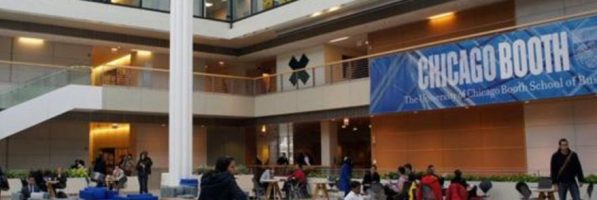Chicago Booth Alumni Gift Funds Marketing Professorship and More

In recognition of the many ways that Chicago Booth has impacted his career, Jim Kilts (Booth MBA ’74) recently make a $4.25 million donation to create the Kilts Family Professorship and the Kilts Faculty Research Prize for Excellence in Marketing. His gift will also go toward providing additional support for the James M. Kilts Center for Marketing. This is just a small piece of the more than $12.5 million that the Chicago Booth alumni has donated to the school’s marketing efforts over the last 20 years.
Through his gifts, Kilts hopes that Chicago Booth will remain on the cutting edge of marketing education. He already believes it’s the best marketing school in the world, and he credits the exceptional faculty, data resources, and multi-disciplined approach with making that possible. Another piece of that success is the Kilts Center, which has a long-standing relationship with Nielsen; this allows them to distribute data sets to more than 1,000 researchers from 130 academic institutions.
According to Jean-Pierre Dubé, Sigmund E. Edelstone Professor of Marketing and Director, Kilts Center for Marketing, “Jim Kilts’ gift to create a new professorship and a new faculty research prize will play an instrumental role in supporting and recognizing ground-breaking research in marketing, while helping us to attract and retain the world’s top marketing scholars.”
About Jim Kilts

Jim Kilts started his career at General Foods when he was just a teenager. By college, he was a lab technician, and that paved the way for his future career. After earning his MBA at Chicago Booth in 1974, Kilts went on to become CEO of three iconic consumer goods companies: Kraft, Nabisco, and Gillette. Later, he founded a financial advisory and private equity firm, and he credits Chicago Booth with much of his success.
“It’s always been a great school and I owe my prosperity to the University of Chicago, the institution which changed my life,” Kilts says. “I hope my latest gift provides the added support to help make Booth the best marketing school in the world.”
Read more about the gift and the Chicago Booth alumni on the Chicago Booth news site.
This article has been edited and republished with permissions from its original source, Clear Admit.
Kellogg Investigates Impact of Automation on Smaller Cities, and More – Chicago News

Let’s explore some of the most interesting stories that have emerged from Chicago business schools this week.
How Will Automation Affect Different U.S. Cities? – Kellogg Insights
Northwestern University Kellogg School of Management‘s Hyejin Youn, an assistant professor of management and organization, just published new research in which she and her colleagues explore the unique industrial impacts of automation on different cities across the country.
Youn predicts that automation will have a more pronounced impact on smaller cities whose industries are populated by easily automated jobs (think card dealers, cashiers, and accountants). These cities are likely to experience a hollowed out middle class precipitated by “an exodus of workers, as well as exacerbated income inequality.”
According to the article, larger cities with greater “shares of managerial and knowledge professions (like lawyers, scientists, and software developers), [which] require knowledge and skills that cannot easily be taught to a machine, they will offset the total impact of automation.”
You can learn more about Youn’s research here.
More Than Jobs Than Job Seekers in Elkhart – Mendoza Ideas & News
Fox 26 Houston recently interviewed Notre Dame Mendoza College of Business finance professor Jason Reed about a fascinating discovery that there are “more job openings in Elkhart, Indiana, than there are workers to fill them.” According to recent Labor Department statistics, this news is indicative of the realities of many communities in the Midwest.
You can watch the entire interview below.
In many cities there are never too many job openings, but here’s one city where the economy is so good that there are more jobs than there are workers to fill them. Fox News’ @MattFinnFNC reports. pic.twitter.com/lwfBAhGaBz
— Ivory Hecker FOX 26 (@IvoryHecker) April 9, 2018
Are You Ready For Personalized Pricing? – Booth Business Blog
University of Chicago Booth School of Business professors Sanjog Misra and Jean-Pierre Dubé have published new research that many companies have begun exploring “personalized pricing” or tailoring their prices to individual customers—a practice that dates back at least 150 years to the days of haggling with Wanamaker’s sales staff but is relatively nascent in the era of Amazon.
According to the article, the researchers found that by “testing a range of introductory prices for online job board ZipRecruiter, the company could have more than doubled its standard price of $99, increasing revenues despite the smaller number of customers willing to pay more.”
The practice is not without potential controversy, as Dubé explains: “In markets where prices are transparent and customers can easily figure out what other people are paying, that’s where you run the risk of a backlash.”
Learn more about the duo’s research here.
